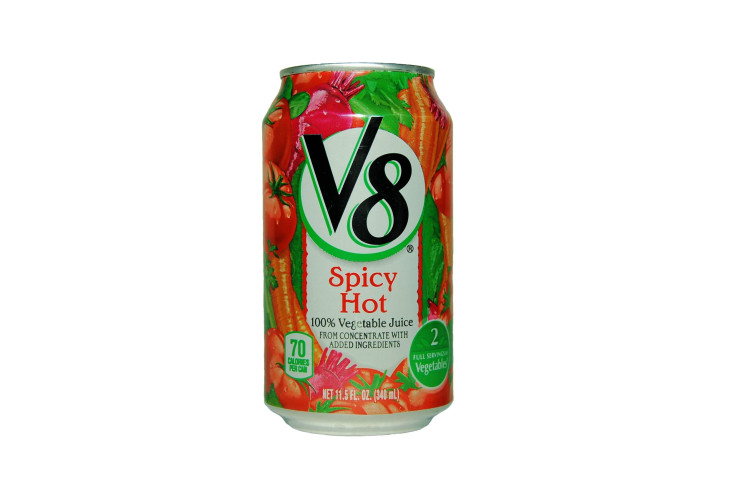V8 Might Not Really Be Vegan, But May Contain Animal Products: What You Need To Know About ‘Natural Flavoring’

At this point it’s just a rumor, but one food blogger has pointed out that Campbell’s vegetable juice, V8, may not be comprised solely of vegetable matter as many might assume. There’s a risk that it contains animal products.
Food Babe is the blog of Vani Hari, and in one of her most recent posts she declares that “there might be dead animal parts in your V8!”
On Campbell’s Food Service website, V8 Vegetable Juice is described as being a “uniquely satisfying blend of eight vegetable juices” that is “vitamin-rich and helps your patrons get 2 servings of vegetables in every nutritious 8-ounce serving for a balanced lifestyle.” Though it’s listed as gluten free, there are no other descriptions on the site or label that hint towards V8 containing animal products. Food Babe points out that V8’s label lists “100% Vegetable Juice” in big letters across the front of the bottle, but when you read the ingredients, you’ll find that along with water and tomato concentrate, as well as carrot, celery, beet, parsley, lettuce, watercress, and spinach juice — V8 is made with “Flavoring,” which may include animal products.
And it turns out that Campbell’s has admitted to that — after being asked about it on Twitter. “Yes, they may include meat/seafood/poultry/dairy when the function in the food is flavoring rather than nutrition,” Campbell tweeted, according to a screenshot on Food Babe’s site. In response to one Twitter user, Campbell tweeted: “[V8]’s not [vegan]. We don’t offer any vegan products. Sorry to disappoint. –RW.” Strangely enough, however, when Medical Daily checked the Twitter accounts of both Campbell’s Cares and the Twitter users who were questioning V8, there was no trace of the conversation — possibly to avoid controversy.
So What’s The Big Deal?
Whether or not V8 is truly vegan or not, it’s important to be aware of the label “Natural Flavorings” on your food products. Since companies are not required to list the source of these flavorings, they can refer to anything that’s made in nature — from plants to any variety of meat. According to the U.S. Code of Federal Regulations, natural flavor or flavoring is “the essential oil, oleoresin, essence or extractive, protein hydrolysate, distillate, or any product of roasting, heating or enzymolysis, which contains the flavoring constituents derived from a spice, fruit or fruit juice, vegetable or vegetable juice, edible yeast, herb, bark bud, root, leaf or similar plant material, meat, seafood, poultry, eggs, dairy products, or fermentation products thereof, whose significant function in food is flavoring rather than nutritional.”
As opposed to artificial flavoring, natural just means that before it went through chemical processes, the origin of the flavoring was found in nature as opposed to being synthetic. It’s very possible that companies might list “natural flavorings” as a way to hide animal products from consumers.
“I’ve seen “natural flavorings” listed on everything from Monster Energy to Quaker Oat Bran Cereal to Earth Balance butter spread and everything in between,” one vegan food blogger writes on Happy Cow Veggie Blog. “I say this because you could honestly make yourself nuts over what’s lurking around in your packaged food and drink. Rather than getting overly obsessed about it, avoid purchasing a lot of pre-packaged, processed foods and for the ones you really love, call the company.” Before jumping to conclusions on V8, however, if you’re a vegan, you might want to come up with your own recipes for vegetable juice if you haven’t already. Food Babe provides one on her post for those of you who are feeling experimental.



























